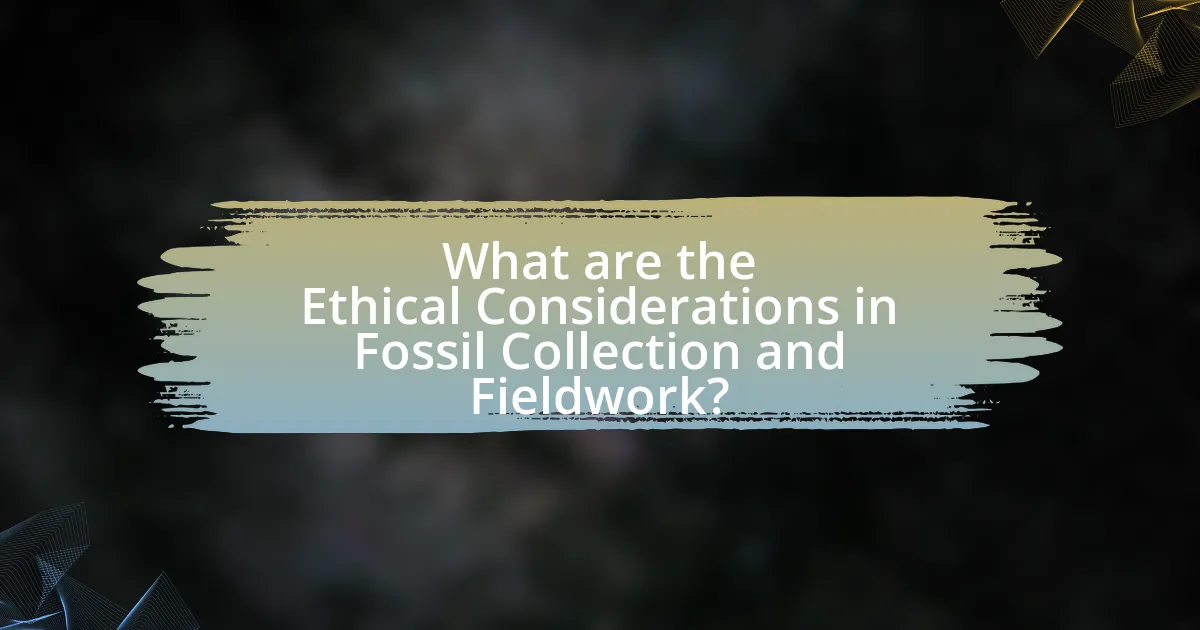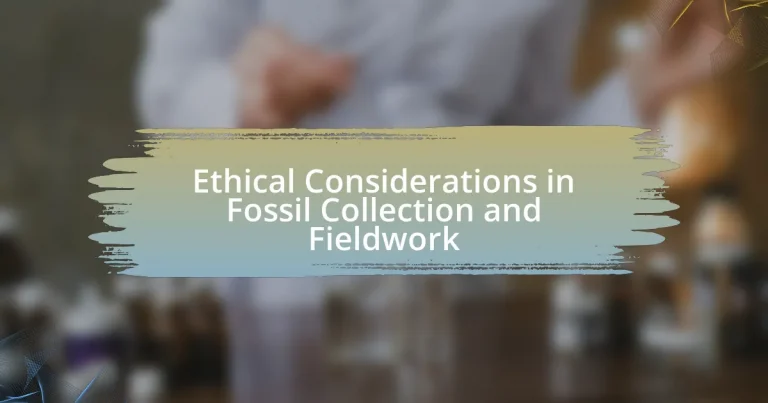The article focuses on the ethical considerations in fossil collection and fieldwork, emphasizing the importance of scientific integrity, legal compliance, and respect for local ecosystems and cultural heritage. It outlines the ethical dilemmas faced by fossil collectors, including issues of legality, ownership rights, and the impact of commercial trade on scientific research. The article also discusses the legal frameworks governing fossil collection in various countries, the role of institutions in establishing ethical guidelines, and the consequences of unethical practices on scientific integrity and local communities. Best practices for ethical fossil collection are highlighted, along with available resources for collectors to ensure compliance with ethical standards.

What are the Ethical Considerations in Fossil Collection and Fieldwork?
Ethical considerations in fossil collection and fieldwork include the preservation of scientific integrity, respect for local laws and regulations, and the impact on ecosystems and cultural heritage. Researchers must ensure that fossil collection does not harm the environment or disturb significant archaeological sites, as outlined by the Society of Vertebrate Paleontology’s guidelines, which emphasize responsible collecting practices. Additionally, obtaining permits and collaborating with local communities are crucial to uphold ethical standards and promote shared benefits from fossil discoveries.
Why is ethics important in fossil collection?
Ethics is important in fossil collection because it ensures the responsible and sustainable management of paleontological resources. Ethical practices prevent the destruction of scientific data and promote respect for the cultural and historical significance of fossils. For instance, unauthorized collection can lead to the loss of context, which is crucial for understanding the evolutionary history of species. Furthermore, ethical guidelines help protect fossil sites from commercial exploitation, ensuring that fossils remain accessible for research and education. This is supported by the American Society of Vertebrate Paleontology’s Code of Ethics, which emphasizes the importance of scientific integrity and stewardship in fossil collection.
What ethical dilemmas do fossil collectors face?
Fossil collectors face several ethical dilemmas, primarily concerning the legality and morality of their collection practices. One significant dilemma is the potential for illegal collection from protected sites, which can lead to the destruction of valuable scientific information and disrupt ecosystems. Additionally, collectors often grapple with the question of ownership and the rights of indigenous peoples or local communities over fossil resources found on their lands. The commercial trade of fossils raises further ethical concerns, as it can prioritize profit over scientific research and conservation, undermining the integrity of paleontological studies. These dilemmas highlight the need for responsible collecting practices that respect legal frameworks and promote ethical stewardship of paleontological resources.
How do ethical considerations impact scientific research?
Ethical considerations significantly impact scientific research by guiding the conduct and integrity of studies, particularly in sensitive areas like fossil collection and fieldwork. These considerations ensure that research is conducted responsibly, respecting both the environment and the rights of local communities. For instance, ethical guidelines often require researchers to obtain permits and permissions before collecting fossils, which helps prevent illegal excavation and promotes sustainable practices. Furthermore, adherence to ethical standards fosters public trust in scientific findings, as seen in the case of the American Association for the Advancement of Science, which emphasizes the importance of ethical conduct in research to maintain credibility and accountability.
What are the legal frameworks governing fossil collection?
The legal frameworks governing fossil collection include national laws, international treaties, and local regulations that dictate how fossils can be collected, owned, and traded. In the United States, the Paleontological Resources Preservation Act (PRPA) of 2009 regulates the collection of fossils on federal lands, requiring permits and adherence to specific guidelines to protect paleontological resources. Additionally, the Convention on International Trade in Endangered Species of Wild Fauna and Flora (CITES) may apply to certain fossils, particularly those from endangered species, restricting their trade to prevent exploitation. Local laws can also impose additional restrictions, emphasizing the need for collectors to be aware of and comply with all applicable legal requirements.
Which laws regulate fossil collection in different countries?
Laws regulating fossil collection vary significantly across countries. In the United States, the Paleontological Resources Preservation Act of 2009 protects fossils on federal lands, requiring permits for collection. In Canada, fossil collection is governed by provincial laws, such as the Alberta Historical Resources Act, which mandates permits for excavation. In the United Kingdom, the Wildlife and Countryside Act 1981 and the Ancient Monuments and Archaeological Areas Act 1979 provide frameworks for fossil protection. Australia has state-specific regulations, like the Fossil Heritage Act in New South Wales, which protects significant fossil sites. These laws ensure the preservation of paleontological resources and promote ethical practices in fossil collection.
How do these laws influence ethical practices in fieldwork?
Laws significantly influence ethical practices in fieldwork by establishing guidelines that protect both the environment and cultural heritage. These regulations, such as the National Historic Preservation Act and the Archaeological Resources Protection Act, mandate that researchers obtain permits and conduct assessments to ensure that fossil collection does not harm sensitive sites. Compliance with these laws fosters responsible behavior among fieldworkers, promoting respect for the scientific integrity of the sites and the communities involved. For instance, adherence to these legal frameworks has been shown to reduce instances of illegal excavation and looting, thereby preserving valuable scientific data and cultural artifacts for future research.
What role do institutions play in ethical fossil collection?
Institutions play a crucial role in ethical fossil collection by establishing guidelines and standards that govern the practices of fossil excavation and curation. These organizations, such as museums and universities, often create policies that ensure fossils are collected legally, responsibly, and with respect for the scientific community and local regulations. For instance, many institutions require permits for fossil collection and emphasize the importance of collaboration with local communities and landowners. This approach not only promotes ethical practices but also fosters public engagement and education about paleontology. Furthermore, institutions often provide training for researchers and collectors on ethical standards, ensuring that fossil collection contributes positively to scientific knowledge without harming cultural heritage or the environment.
How do museums and universities establish ethical guidelines?
Museums and universities establish ethical guidelines through a collaborative process involving stakeholders, including faculty, researchers, and community representatives. This process typically includes the review of existing ethical standards, consultation with legal experts, and adherence to professional codes of conduct, such as those provided by the American Association of Museums and the American Anthropological Association. For instance, the American Association of Museums emphasizes the importance of stewardship, accountability, and transparency in their ethical guidelines, which museums adopt to ensure responsible practices in collections and research.
What responsibilities do institutions have towards fossil preservation?
Institutions have a responsibility to ensure the preservation of fossils through proper collection, curation, and research practices. This includes adhering to ethical guidelines that promote the responsible excavation of fossils, ensuring that specimens are documented accurately, and maintaining their integrity for future study. For instance, institutions must comply with legal frameworks such as the Paleontological Resources Preservation Act, which mandates the protection of fossils on public lands and promotes scientific research while preventing illegal collection. Additionally, institutions are tasked with educating the public and researchers about the significance of fossils, fostering a culture of conservation and respect for paleontological resources.
How can ethical practices be promoted in fossil collection?
Ethical practices in fossil collection can be promoted through the establishment of clear guidelines and regulations that govern the collection process. These guidelines should emphasize the importance of obtaining permits, respecting land ownership, and ensuring that fossil collection does not harm the environment or disrupt local ecosystems. For instance, organizations like the Society of Vertebrate Paleontology provide a code of ethics that encourages responsible collecting practices, including the documentation of fossil locations and the sharing of findings with the scientific community. Additionally, educational programs aimed at both collectors and the public can raise awareness about the significance of fossils and the need for ethical stewardship, thereby fostering a culture of respect and responsibility in fossil collection.
What training is available for ethical fossil collectors?
Training for ethical fossil collectors includes workshops, online courses, and field seminars that focus on responsible collecting practices, legal regulations, and conservation ethics. Organizations such as the Society of Vertebrate Paleontology and the Paleontological Society offer resources and training programs aimed at educating collectors on the importance of ethical practices in fossil collection. These programs often emphasize the significance of obtaining permits, respecting land ownership, and understanding the ecological impact of fossil collecting.
How can collaboration enhance ethical fieldwork practices?
Collaboration can enhance ethical fieldwork practices by fostering diverse perspectives and shared accountability among researchers. When multiple stakeholders, including local communities, scientists, and ethicists, work together, they can identify and address ethical dilemmas more effectively. For instance, collaborative efforts can lead to the development of guidelines that respect cultural heritage and promote sustainable practices, as seen in projects like the “Collaborative Research in the Humanities” initiative, which emphasizes community involvement in research processes. This collective approach not only improves the ethical standards of fieldwork but also builds trust and transparency, ensuring that all voices are heard and considered in decision-making.
What are the consequences of unethical fossil collection?
Unethical fossil collection leads to significant scientific, cultural, and environmental consequences. The removal of fossils without proper documentation or permission disrupts the scientific record, making it difficult for researchers to understand the context and significance of the finds. This lack of context can result in the loss of valuable information about evolutionary history and biodiversity. Additionally, unethical practices can damage or destroy fossil sites, which are often irreplaceable and hold critical data for future studies. Culturally, such actions can disrespect the heritage of indigenous communities who may have historical ties to the land and its fossils. Furthermore, the illegal trade of fossils undermines conservation efforts and can contribute to the degradation of ecosystems where these fossils are found.
How does unethical collection affect scientific integrity?
Unethical collection undermines scientific integrity by compromising the reliability and validity of research findings. When fossils are collected without proper permits or in violation of ethical guidelines, the resulting data may be flawed or incomplete, leading to inaccurate conclusions. For instance, studies have shown that improper excavation techniques can damage specimens, resulting in loss of critical contextual information necessary for accurate scientific analysis. This not only misrepresents the scientific record but also erodes public trust in scientific research, as seen in cases where fraudulent claims about fossil discoveries have been made. Thus, unethical practices directly threaten the foundational principles of transparency and accountability in science.
What impact does it have on local communities and ecosystems?
Fossil collection and fieldwork can significantly disrupt local communities and ecosystems by altering land use and threatening biodiversity. The extraction of fossils often leads to habitat destruction, which can displace local wildlife and disrupt ecological balance. For instance, studies have shown that fossil excavation can lead to soil erosion and degradation of natural habitats, impacting species that rely on those environments for survival. Additionally, local communities may face economic challenges if fossil collection activities overshadow traditional practices such as agriculture or tourism, which can diminish their livelihoods.
What best practices should be followed in ethical fossil collection?
Ethical fossil collection should prioritize obtaining permits, respecting land ownership, and adhering to scientific guidelines. Collectors must secure necessary permits from relevant authorities to ensure legal compliance, as unauthorized collection can lead to legal repercussions and damage to scientific integrity. Additionally, respecting private and public land ownership is crucial; collectors should always seek permission from landowners before excavating fossils. Following established scientific guidelines, such as those set by organizations like the Society of Vertebrate Paleontology, ensures that fossil collection contributes positively to scientific knowledge and conservation efforts. These practices help maintain the integrity of fossil records and promote responsible stewardship of paleontological resources.
How can collectors ensure compliance with ethical standards?
Collectors can ensure compliance with ethical standards by adhering to established guidelines and best practices in fossil collection. This includes obtaining necessary permits, respecting land ownership, and following local and international laws regarding fossil excavation. For instance, the Society of Vertebrate Paleontology provides a code of ethics that emphasizes the importance of scientific integrity and the preservation of fossil resources. Additionally, collectors should engage with local communities and stakeholders to promote transparency and foster collaborative relationships, which can enhance ethical practices in the field.
What resources are available for ethical fossil collectors?
Ethical fossil collectors can access various resources to guide their practices, including organizations, publications, and online platforms. The Society of Vertebrate Paleontology provides a code of ethics that outlines best practices for fossil collection, emphasizing the importance of legal compliance and scientific integrity. Additionally, the Paleontological Society offers educational materials and guidelines for responsible collecting. Online platforms like Fossil Collecting Forum and various social media groups facilitate discussions among collectors about ethical practices and local regulations. These resources collectively support ethical fossil collection by promoting awareness and adherence to established guidelines.





